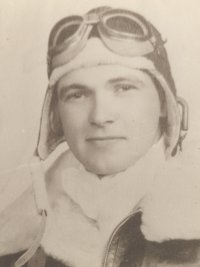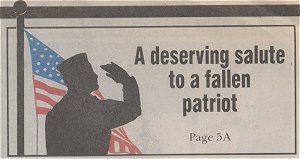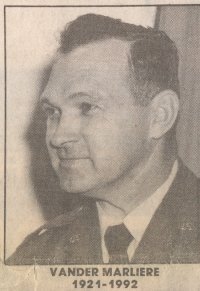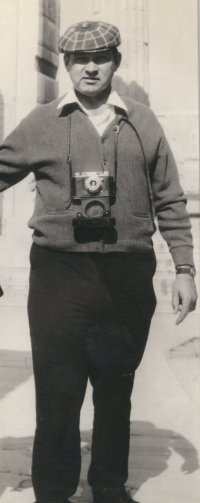

 |
 |
| Stalag VII A: Oral history |
| Gilbert VanderMarliere |

Remembering my late husband Gilbert VanderMarliereBy Helen VanderMarliere Kent Thank you for preserving history and for inviting me to share my limited knowledge of an almost 28 year span of my late husband's career. Gilbert and I were married five years after his retirement (1975). I humbly submit the following: A deserving salute to a fallen patriot
We humbly salute a quiet local heroLt. Col. Gilbert VanderMarliere lived a good life, and by all measures was a real patriot. While the veteran of three wars might not be known by today's younger generation we feel the late Chesterfield Township resident warrants more than a passing note on the obituary page. He truly represents the caliber of men and women who serve their nation, and today's editorial tribute is dedicated to all who serve and who do their job without fanfare. From this vantage point, we feel the retired Air Force lieutenant colonel was the kind of person who best personifies heartland America. He did what had to be done because America was more than a place to live. It was his country and to VanderMarliere, that was enough. 
After retirement from the service in 1970, the Grosse Pointe Farms native went to work in the transportation division for the city of Detroit. In recent years he fought for his life against the pain of cancer and he never asked for favors or sympathy. Helen, was at his bedside. It was an extra-special day that he had prayed to see and enjoy with his caring wife. It was their 17th wedding anniversary. For the decorated airman, we go back to April 24, 1944. As pilot of a B-17 that day in time, heavy German anti-aircraft firepower hit VanderMarliere's "flying fortress". Though at the controls of a crippled plane, and wounded by exploding shell fragments, he was able to guide his craft to a crash landing on a German farm. While the farmers tried to protect the wounded pilot, military officials were finally notified because it was feared the American airman would not survive unless he received medical treatment for his wounds. The next happiest day in VanderMarliere's life came a year later on April 29, 1945, when he was freed by advancing American armored units, and was able to return to the United States for a full recovery from his war wounds. But it wasn't long before the trumpets of war, in rugged terrain of a place called Korea, would pull our patriot back into service. And again he took part in combat missions, concentrating on rescue flights. Later, when fighting erupted in Vietnam, his call came again as the Air Force utilized VanderMarliere's skills to help train our airmen in rescue missions while flying out of the Udorn Air Base in Thailand. In total, VanderMarliere logged 28 years of active and reserve service spanning three wars. Yet he never extolled the Air Force Cross or Purple Heart medals he had received for having served in three armed conflicts. VanderMarliere's final resting place will be at Fort Custer National Cemetery in Battle Creek with other men and women who served out of love for their country. One of VanderMarliere's last wishes was that he could be best remembered through donations to the "good people at St. Joseph Hospice". We agree. We also feel an editorial salute is due this man who served in three wars. And we extend that salute to his wife, his sons and daughters, sisters, 21 grandchildren and 14 great-grandchildren. Farewell, Lt. Col. Gilbert VanderMarliere." (From the Thursday, September 10, 1992 edition of The Macomb Daily newspaper) Here is his story of April 24, 1944: "We are approaching Oberpfaffenhofen. 1st Lt. William R. James is checking me out to be first pilot. Sidney Shertzer, the bombardier, is on his first mission. Raymond Uhrich is the navigator. George A. Vogt is the engineer at the top turret. William O. Elliott is at the radio-gunner spot. Everett L. Minto and James R. Copeman are the waists. Walter Lastinger is the tail gunner. The altimeter reads 24,000 feet. It's quite a beautiful sight as I look about the terrain. The sun is bright also and visibility is unlimited. This is my third mission. Remembering my recent dream of disaster, I double-checked my chest-pack. I dreamed that the plane exploded before I had a chance to put it on. Bearing this in mind, I tied a rope from it to my parachute just as a precaution. Everything seemed to be going quite well and smooth. The left seat of the Flying Fortress is a comfortable one. Such a wonderful flying machine she is for our crew... The silence was broken by the staccato sound of metal on metal. As I peer into the sun, I see blinking lights that remind me of Christmas tree lights. I then recognize the ME 109s as the staccato sound of metal hitting metal rakes (the front of the B-17). Then -- pow -- a large hole appears at my left hip and elbow. A 20mm shell burst into my generator control panel. I feel stinging in my left forearm and left thigh and a burning sensation. I also smell smoke (gun smoke) in my oxygen mask. That can't be unless my oxygen line had burst and it had. As I glanced at the altitude, it was 24,000 ft. I then passed out. Two engines were gone and a third one was lost shortly thereafter. My left leg and left arm become numb as the cannon shells entered them. My generator panel is stricken and the control column is dead. Breathing is impossible. I'm going to faint. James tries to control the aircraft. Vogt quickly utilized a walkaround bottle by plugging same into my mask. Our intercom was useless, so the bailout order had to be passed by word-of-mouth. Once again, I passed out. When I awakened, we were at 14,000 feet and James was repeatedly urging me to bail out now! The left window was much to small for an exit. I managed to grab that rope connected to the chest pack parachute and struggled to the nose hatch. As I watched the chest-pack fall out of the open hatch, with all the strength left in me, I flung the pack back into the plane and snapped it in place and bailed out. Now I am pinned against the fuselage between the escape hatch and the bomb bay doors. The force of the diving plane is pressing against my being with great force. This spread eagle position outside of my Fortress is sure to be my end soon. Suddenly, the doors swing open and seemingly my last breath is nearer. The doors are swaying back and forth. I must push when their positions are furthest apart. Timing is on my side and I am at last parted from my craft. James was safely out and parachuted unhurt to the ground. Shertzer and I never met. The tower sent him aboard after engine start when I informed them we were ready to taxi and needed a bombardier. Sidney was quickly beckoned to join us on his first mission. He and I are found by friendly German farmers who hid us. Sidney is weak also. His landing was in a tree 50 feet from the ground. Unfortunately, he cut the wrong shroud lines and fell on his back to the earth. The devastating impact caused him 2 crushed vertebrae and unbearable pain. We had to come out of hiding, as immediate medical attention for both of us was needed to survive. The ambulance takes us to a military post, then to the University of Munich Hospital. I now meet Sidney Shertzer for the first time. Now, he does not believe that I was part of the crew and suspects I am a spy instead. As we are carried into the hospital, I converse in French to a nurse, who convinces him more that I am lying. It took plenty of explanation on my part to finally make a believer out of him. After six weeks in the hospital, I was introduced to Stalag Luft III. My world is now encased in barbed wire. The Geneva Convention says we must get clothing and footwear. The Red Cross would surely help. A lot of our clothing is confiscated. We are fed. It behooves all to accept the facts before us and acclimate. Morale must remain in the forefront. The longing to be home with our families is always present. There would be plenty of time to reflect on the past and hope for the future. Idle time should consist of conversations condusive to education, reading, exercise and planning. We each took turns cooking for the group. Our mainstay is soup. We are given potatoes and beans to work with. Many dispaired and just wanted to smoke and not eat. The morale became generally poor as time passed. Stamina lessened as we watched each other lose weight. Those who are gifted in music get together to entertain. It is April 29, 1945. We were sitting on our wooden bunks. There was unusual commotion outdoors. There were the sounds of tanks, comingled with American voices. I rushed outside with the others. Our German guards' arms were raised. Their rifles were on the ground. General Patton led his Armored Division further into the compound. I watched as he ordered the American flag raised. I cried. We were free! It was difficult to say goodbye to my fellow POWs. I knew this brotherhood would stay in my heart. Sidney and I would go directly to England. We grabbed our meager belongings and hitched a ride on one of General Patton's tanks. The driver took us to a convoy and bade us farewell. We returned to Thurleigh and awaited our flight to rest and relaxation." 
Now, I (Helen) must write: After we were married, Gilbert took me to Europe several times in the late 1970s and the early 1980s. He was diagnosed with cancer in 1985. I had never been to Europe. He loved driving through Germany and and we enjoyed the beauty of the countryside together, along with the cities. My sister married a German-born man (Frank Schwartz), who is now deceased. Frank's parents were a delight as I was growing up. In 1984 we met a delightful German elderly man who was in the nursing home. We were there to visit someone else. He was a stroke victim and could not talk, but was able to make sounds and gestures. He recognized our last name. His wife was with him at the time. She was an American nurse he met in Germany during WWII. She immediately knew what her husband was thrying so hard to relate to Gilbert. This man was on the ground and fired anti-aircraft rounds at the Flying Fortress on the day Gil and his crew were shot down. He even remembered the tail number. This was an amazing moment to witness. Gilbert and this gentleman embraced each other. They were both elated to meet each other after so many years. I can't even find appropriate words to express my joy at this sight. After Gilbert died in 1992, I spent 6 years working here in the U.S. in international soccer. In 1994, the USA hosted the World Cup and I had the pleasure of meeting the German National Team in Michigan. Thank you for the opportunity to write. I send you warm smiles and wish you success in all your endeavors in the preservation of history. I continue to pray for world peace. Sincerely, Helen VanderMarliere Kent Just one day after mailing a letter and the photographs for this web page, Helen VanderMarliere passed away. This is the eulogy her granddaughter, Karen VanderMarliere, gave at her funeral service: Helen Theresa VanderMarliere KentJune 26, 1940 ~ June 11, 2005 Ecclesiastes 3 tells us there is a time for everything, for every purpose under heaven. If you haven’t read the Holy Bible then you have probably heard these words in a famous song at some point. “There is a time to be born, a time to die. A time to laugh, a time to cry; a time to grieve…and a time to dance.” On this day, and any day I think of Helen I believe she truly lived out every part of Ecclesiastes 3 with all her heart, body and soul. I never knew Helen to take any purpose, any emotion or any one for granted. Now, if you ask anyone who truly knew Helen just what it was she loved most about life, they would likely say, “Food!” I believe there are many of us who only wish we would enjoy the small things in life as much as Helen did. For even enjoying a simple meal, she did with gusto, enthusiasm, and always appreciation for the person who cooked it and served it. When I visited Helen a couple of months ago she told me, “I’m proof that ‘low carb and lovin’ it’ do not mix!” Helen was a class act through and through. From her gorgeous figure she was able to maintain, no matter what her dress size was; to her love of life, her love of people; right to the heart of who she was. Most of us who knew her and who will never stop loving her can attest to the fact however, that Helen’s actual favorite things in this life were her family and friends. While Helen never had any kids of her own, we all know she actually had lots of kids! For those of us fortunate enough to be considered ‘one of hers’, we know there is no one who will ever fill that space in our hearts like she did. Helen’s first real love of her life, of course, was Gilbert, my grandfather. They were an amazing couple. Helen spoke often of her wonderful Gilbert. Her words about him were always generous, always loving and ever appreciative of the blessings she was able to share with him. Thankfully, because of the second true love of her life, Dick Kent (or Kent, as she loved to call him.) Helen was able to express herself, her love and her thankfulness for Gilbert without fear because she knew that in Dick’s arms she was truly loved and respected for who she was and for what she had gone through in her lifetime. Helen’s life was revived and revitalized when she met Dick. She truly loved and adored him. And I personally thank you Dick, because when you came along, you saved her. In an email Helen sent me just hours before she died, she wrote..” and as I’ve always told you my dear one, I have been blessed in my lifetime to have two wonderful men to love me. And who can ask for more than that?” Helen worked hard to see the good in others, no matter how poorly others may have seen her at times. It was by her choice she held her head high and lived her life the way she wanted to. And I believe she did it well…very well. Helen didn’t just excel at being a wife or a caregiver…She was “A class act.” As Gilbert used to call her; or “She’s one classy broad.” as Dick likes to say. Helen was at the top of her class in whatever she did…as wife, companion, Auntie, Granny, sister, daughter, friend, confidante, step mom, pen-pal, night owl, slot machine bandit, card player, sun goddess, researcher, writer, poet, piano player, dancer, romantic…She was graceful, energetic and insightful even unto her last hours with us. Helen knew no stranger - and if she did, it wasn’t long before she called them ‘friend’ or invited them into her circle of family. Helen always wanted what was best for the people she cared about and prayed she was treated the same in return. But if she wasn’t, she still held her head high with shoulders straight and square, as only a class act like her could. If Helen was loyal to you she expected the same in return, though all she ever asked was for you to give your best effort. For those of us who have ever been on the receiving end, you know that Helen could encourage you and somehow chew you out at the same time! But she did it with wisdom and love. John Scott and I were commiserating about that very fact just yesterday. Certainly more than any other niece, nephew or grandchild, John Scott felt the significance and importance of Helen’s life here with us. To John Scott, Auntie Helen was not only a lifeline and a mentor but a Mom. No matter what venture he endeavored to set out on, she was there supporting him…Taking him to soccer games and try-outs; helping him get his first job, buy his first truck, start his own business; and she excelled at shoving every other parent out of the way to make sure she got a snapshot of every awesome moment, be it a victory or not, that he had while growing up. She taught John Scott how to truly live life to the fullest. Some of John Scott’s fondest memories of Helen are similar to ones many of us have…spending precious time alone, one on one with Helen…doing anything and everything, as she gave you her undivided attention, making you feel like anything was possible when you had her support. I would be remiss at this point if I didn’t share with you all the fact that Helen did indeed have a third man in her life though. She loved him dearly. (Sorry Dick, but I believe you already know this anyhow.) And, in fact, I think if I didn’t express Helen’s thoughts and feelings about this other man, the next time I see her she’ll kick my butt. Because of this man, Helen knew that no matter what happened she always had someone she could count on. Without a doubt, the apple of her eye and a great part of her heart was truly John Scott. In that email Helen sent me that I spoke of before, she said that John Scott had talked to her about taking better care of herself. She wrote, “Johnny chewed be out better than my Daddy ever thought about.” And she loved it. She counted on it. She counted on him. (Johnny, don’t ever doubt that you were and still are very much loved by her.) I pray that you all will take great comfort, as I do, in knowing that as difficult as losing her from our arms right now is, she is now where she needs to be. Helen had faith that could move a mountain and if you knew her well, you would say she had moved many personal mountains over her lifetime. Helen’s faith in God and love of her family that was instilled in her by her parents, Mary and Joseph, grew ever stronger throughout her lifetime. For those of us blessed to know her well, you know where she is now and whose arms she is in. When we told my eight-year-old son that Granny Helen had died, in the midst of my crying he said, “Don’t worry Mama, I think she’s in heaven right now playing Bingo.” That’s how Helen wants us to think of her - happy, joyful, laughing and loving. It seems the last few days every time I turn around I can hear her laughter ringing in my ears and that’s a good thing! I pray that each of you whom she loved so much also hears her laughter when you remember her. I think one of the best ways to honor Helen is to strive to live as well, as classy and as true as she did. “Live well, laugh often, love much…” That’s how our wonderful Helen lived. That’s how she wants all of us to continue to live…..
|
| Last update 19 July 2005 by © Team Moosburg Online - All rights reserved! | |||